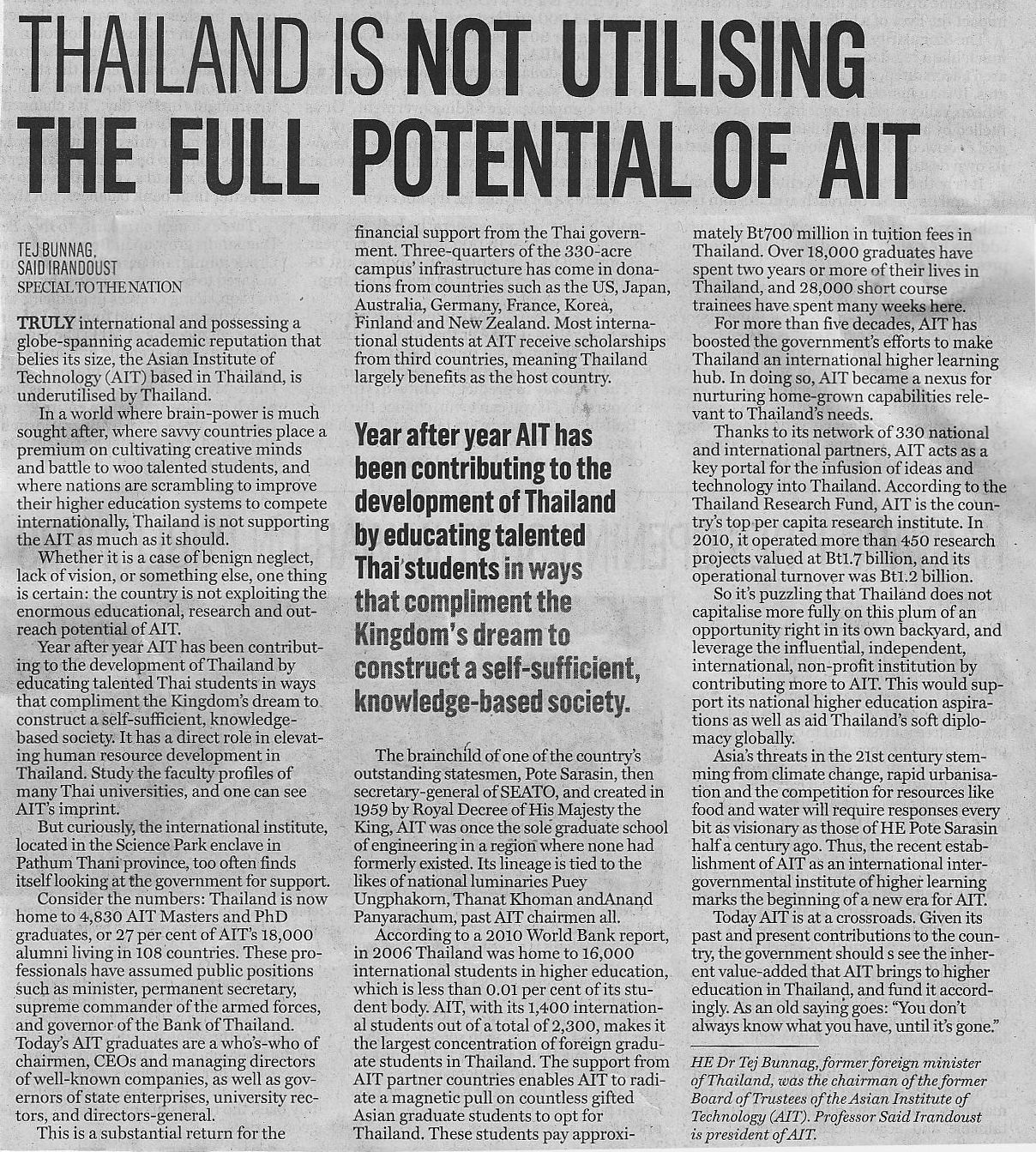The article highlights how AIT has been contributing to the higher
education system in Thailand, and how the host country benefits from
AIT. It also suggests that Thailand can capitalise on AIT’s unique
position.
The entire article can be read at this link:
http://www.nationmultimedia.com/opinion/Thailand-is-not-utilising-the-full-potential-of-th-30181151.html
full potential of the AIT
Tej Bunnag,
Said Irandoust
Special to the Nation May 3, 2012 1:00 am
Truly international and possessing a globe-spanning academic
reputation that belies its size, the Asian Institute of Technology
(AIT) based in Thailand, is underutilised by Thailand.
In a world where brain-power is much sought after, where savvy
countries place a premium on cultivating creative minds and battle to
woo talented students, and where nations are scrambling to improve
their higher education systems to compete internationally, Thailand is
not supporting the AIT as much as it should.
Whether it is a case of benign neglect, lack of vision, or something
else, one thing is certain: the country is not exploiting the enormous
educational, research and outreach potential of AIT.
Year after year AIT has been contributing to the development of
Thailand by educating talented Thai students in ways that compliment
the Kingdom's dream to construct a self-sufficient, knowledge-based
society. It has a direct role in elevating human resource development
in Thailand. Study the faculty profiles of many Thai universities, and
one can see AIT's imprint.
But curiously, the international institute, located in the Science
Park enclave in Pathum Thani province, too often finds itself looking
at the government for support.
Consider the numbers: Thailand is now home to 4,830 AIT Masters and
PhD graduates, or 27 per cent of AIT's 18,000 alumni living in 108
countries. These professionals have assumed public positions such as
minister, permanent secretary, supreme commander of the armed forces,
and governor of the Bank of Thailand. Today's AIT graduates are a
who's-who of chairmen, CEOs and managing directors of well-known
companies, as well as governors of state enterprises, university
rectors, and directors-general.
This is a substantial return for the financial support from the Thai
government. Three-quarters of the 330-acre campus' infrastructure has
come in donations from countries such as the US, Japan, Australia,
Germany, France, Korea, Finland and New Zealand. Most international
students at AIT receive scholarships from third countries, meaning
Thailand largely benefits as the host country.
The brainchild of one of the country's outstanding statesmen, Pote
Sarasin, then secretary-general of SEATO, and created in 1959 by Royal
Decree of His Majesty the King, AIT was once the sole graduate school
of engineering in a region where none had formerly existed. Its lineage
is tied to the likes of national luminaries Puey Ungphakorn, Thanat
Khoman andAnand Panyarachum, past AIT chairmen all.
According to a 2010 World Bank report, in 2006 Thailand was home to
16,000 international students in higher education, which is less than
0.01 per cent of its student body. AIT, with its 1,400 international
students out of a total of 2,300, makes it the largest concentration of
foreign graduate students in Thailand. The support from AIT partner
countries enables AIT to radiate a magnetic pull on countless gifted
Asian graduate students to opt for Thailand. These students pay
approximately Bt700 million in tuition fees in Thailand. Over 18,000
graduates have spent two years or more of their lives in Thailand, and
28,000 short course trainees have spent many weeks here.
For more than five decades, AIT has boosted the government's efforts
to make Thailand an international higher learning hub. In doing so, AIT
became a nexus for nurturing home-grown capabilities relevant to
Thailand's needs.
Thanks to its network of 330 national and international partners, AIT
acts as a key portal for the infusion of ideas and technology into
Thailand. According to the Thailand Research Fund, AIT is the country's
top per capita research institute. In 2010, it operated more than 450
research projects valued at Bt1.7 billion, and its operational turnover
was Bt1.2 billion.
So it's puzzling that Thailand does not capitalise more fully on this
plum of an opportunity right in its own backyard, and leverage the
influential, independent, international, non-profit institution by
contributing more to AIT. This would support its national higher
education aspirations as well as aid Thailand's soft diplomacy
globally.
Asia's threats in the 21st century stemming from climate change, rapid
urbanisation and the competition for resources like food and water will
require responses every bit as visionary as those of HE Pote Sarasin
half a century ago. Thus, the recent establishment of AIT as an
international inter-governmental institute of higher learning marks the
beginning of a new era for AIT.
Today AIT is at a crossroads. Given its past and present contributions
to the country, the government should s see the inherent value-added
that AIT brings to higher education in Thailand, and fund it
accordingly. As an old saying goes: "You don't always know what you
have, until it's gone."
HE Dr TejBunnag, former foreign minister of Thailand, was the chairman
of the former Board of Trustees of the Asian Institute of Technology
(AIT). Professor Said Irandoust is president of AIT.

